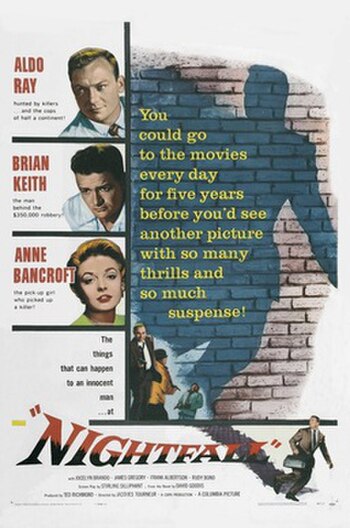A prominent critic opined that in writing Lord of the Flies, William Golding created merely a situation, not a novel. Well, to be sure, Peter Brook‘s film adaptation of the Golding book (from 1963) is not a very novelistic movie and doesn’t have to be. Rather it’s an opus of visual potency. The problem, however, is that it isn’t very well directed. Brook under-emphasizes important points and fails to create a good narrative flow. The young male actors in Flies play schoolboys marooned on an island who become foolish and vengeful brutes, but the performers seem lost, their acting unfocused. The killing of a boy named Simon (Tom Gaman) is ugly but clumsy. The blame falls on Brook. Would that the Francois Truffaut who directed The 400 Blows had made this film.
There are several memorable scenes in what is a truly lousy Sam Peckinpah film—Bring Me the Head of Alfredo Garcia (1974)—which quickly nosedives with an insane script.
Undeniably, a pretty raw experience is offered in this enterprise—raw enough to be offensive. Warren Oates engages in a lot of very dopey, mow-’em-down shooting. Peckinpah strips Isela Vega of her clothes a bit too frequently, and when she confronts Kris Kristofferson . . . well, never mind. See it for yourself if you want to bother.
By the way, I don’t know who Isela Vega is, but her acting has subtlety and quiet appeal. She makes the film seem a little less ridiculous than it is.
The director of Ride the High Country, Major Dundee, and The Wild Bunch made THIS?

Aldo Ray is a mere marionette of an actor in Jacques Tourneur‘s Nightfall (1957) and Anne Bancroft provides little personality in her role. But the film itself is a knockout, finely directed and savvily adapted from a novel by screenwriter Stirling Silliphant. It tells of a free-lance artist (Ray) erroneously believed by murderers—and a possible policeman—to have made off with the evildoers’ loot.
There is nothing of a marionette in Brian Keith; he is disturbingly human, engrossingly true as John, one of the killer-crooks. His character leaves the impression that he should have been a good man. Thanks to Tourneur, there is a nifty scene inside and outside a shack which emphasizes John’s estrangement, all firearms raised, from his fellow murderer (slimy and played by Rudy Bond).
Yoon Ga-eun‘s Korean film The World of Us (2016) is a masterly work about childhood bullying and discontent. Sun (Choi Soo-in) is a lonely young girl non-physically bullied by her schoolmates. A new girl, Ji-ah (Hye-in Seol), enrolls in the school and Sun is clearly motivated to make friends with her, which she does. Things go swimmingly between them until Ji-ah gets chummy with a girl more esteemed than Sun and “learns” to dismiss Sun. But this precedes Ji-ah herself becoming unpopular, and yet the lass persists in taking jabs at Sun—with no glee whatsoever.
Yoon is a truly fine writer and director. The children are drawn knowingly, truthfully, memorably, fleshed out by a palatable cast. The World of Us—of Sun and Ji-ah—turns out to be the WORLD, with its bullying, harshness and sadness, as well as pleasure. The film hopes for at least some of the pleasure to be consistent.
(In Korean with English subtitles. Available on Tubi and Prime Video)
 In the West, the lives of most little girls are hardly devoid of privileges and delights. In China of the 1930s, however, little girls were rigidly undervalued and sold by their impoverished parents (or keepers) to ensure all-around survival.
In the West, the lives of most little girls are hardly devoid of privileges and delights. In China of the 1930s, however, little girls were rigidly undervalued and sold by their impoverished parents (or keepers) to ensure all-around survival.
“Doggie” (Zhou Ron-Ying), the child in the Chinese picture The King of Masks (1996), has keepers, not parents. An elderly street performer, Wang (Zhu Xu), is fooled into thinking she is a young boy and buys her, only to be shocked and dismayed when it transpires she is a girl. It is only a boy who can inherit Wang’s silk mask entertainment trade after he dies. Not without pity, the old man allows “Doggie” to work for him, but a string of awful misfortunes makes it, for a while, impossible for him to support her.
Many a theme receives attention in Wu Tianming‘s rich film: childhood destitution, the ubiquity of injustice, the seeming need (when it is a need) for accepting fate, pariahism. For all its dramatics, King is no masterpiece of drama—it needs a sturdier plot—but it is interesting and beautifully chaste. It ends on a sentimental note but it is also an affecting film.
(In Mandarin with English subtitles)


